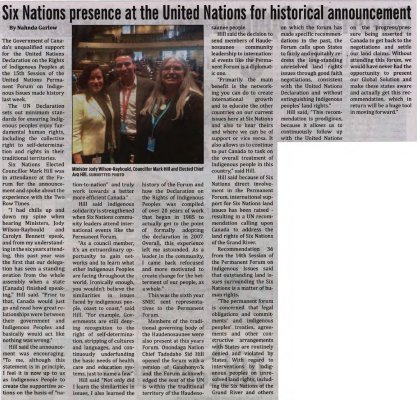"Six Nations presence at the United Nations for historical announcement"
- Publication
- Two Row Times (Six Nations of the Grand River, ON), 18 May 2016
- Full Text
- Six Nations presence at the United Nations for historical announcementBy Nahnda Garlow
The Government of Canada's unqualified support for the United Nations Declaration on the Rights of Indigenous Peoples at the 15th Session of the United Nations Permanent Forum on Indigenous Issues made history last week.
The UN Declaration sets out minimum standards for ensuring Indigenous peoples enjoy fundamental human rights, including the collective right to self-determination and rights in their traditional territories.
Six Nations Elected Councillor Mark Hill was in attendance at the Forum for the announcement and spoke about the experience with the Two Row Times.
"I had chills up and down my spine when hearing Ministers, Jody Wilson-Raybould and Carolyn Bennett speak, and from my understanding in the six years attending, this past year was the first that our delegation has seen a standing ovation from the whole assembly when a state (Canada) finished speaking," Hill said. "Prior to that, Canada would just go and read how great relationships were between their government and Indigenous Peoples and basically would act like nothing was wrong."
Hill said the announcement was encouraging. "To me although this statement is in principle, I feel it is now up to us as Indigenous People to create the supportive actions on the basis of "nation-to-nation" and truly work towards a better more efficient Canada."
Hill said indigenous solidarity is strengthened when Six Nations community leaders attend international events like the Permanent Forum.
"As a council member, it's an extraordinary opportunity to gain networks and to learn what other Indigenous Peoples are facing throughout the world. Ironically enough, you wouldn't believe the similarities in issues faced by indigenous people, coast to coast," said Hill. "For example, Governments are still denying recognition to the right of self-determination, stripping of cultures and languages, and continuously underfunding the basic needs of health care and education systems, just to name a few."
Hill said "Not only did I learn the similarities in issues, I also learned the history of the Forum and how the Declaration on the Rights of Indigenous Peoples was compiled of over 20 years of work that began in 1985 to actually get to the point of formally adopting the declaration in 2007. Overall, this experience left me astounded. As a leader in the community, I came back refocused and more motivated to create change for the betterment of our people, as a whole."
This was the sixth year SNEC sent representatives to the Permanent Forum.
Members of the traditional governing body of the Haudenosaunee were also present at this year’s Forum. Onondaga Nation Chief Tadodaho Sid Hill opened the forum with a version of Ganohonyo'k and the Forum acknowledged the seat of the UN is within the traditional territory of the Haudenosaunee people.
Hill said the decision to send members of Haudenosaunee community leadership to international events like the Permanent Forum is a diplomatic one.
"Primarily the main benefit is the networking you can do to create international growth and to educate the other countries on our current issues here at Six Nations and also to hear theirs and where we can be of support or vice versa. It also allows us to continue to put Canada to task on the overall treatment of Indigenous people in this country," said Hill.
Hill said because of Six Nations direct involvement in the Permanent Forum, international support for Six Nations land issues has been raised resulting in a UN recommendation calling upon Canada to address the land rights of Six Nations of the Grand River.
Recommendation 36 from the 14th Session of the Permanent Forum on Indigenous Issues said that outstanding land issues surrounding the Six Nations is a matter of human rights.
"The permanent forum is concerned that legal obligations and commitments and indigenous peoples' treaties, agreements and other constructive arrangements with States are routinely denied and violated by States. With regard to interventions by Indigenous peoples on unresolved land rights, including the Six Nations of the Grand River and others on which the forum has made specific recommendations in the past, the Forum calls upon States to fairly and equitably redress the long-standing unresolved land rights issues through good faith negotiations, consistent with the United Nations Declaration and without extinguishing Indigenous peoples' land rights."
Hill said, "This recommendation is prodigious, because it allows us to continuously follow up with the United Nations on the progress pressure being asserted to Canada to get back to the negotiations and settle our land claims. Without attending this forum, we would have never had the opportunity to present our Global Solution and make these states aware and actually get this recommendation, which in return will be a huge tool in moving forward."
- Creator
- Garlow, Nahnda, Author
- Media Type
- Text
- Newspaper
- Item Type
- Clippings
- Publisher
- Two Row Times
- Place of Publication
- Six Nations of the Grand River, ON
- Date of Publication
- 18 May 2016
- Subject(s)
- Personal Name(s)
- Wilson-Raybould, Jody ; Hill, Mark ; Hill, Chief Sid (Tadodaho) Hill, Chief Ava ; Bennett, Carolyn.
- Corporate Name(s)
- Government of Canada ; United Nations ; Six Nations Elected Band Council ; Haudenosaunee Confederacy Chiefs Council.
- Local identifier
- SNPL005222v00d
- Language of Item
- English
- Creative Commons licence
 [more details]
[more details]- Copyright Statement
- Public domain: Copyright has expired according to Canadian law. No restrictions on use.
- Copyright Date
- 2016
- Copyright Holder
- Two Row Times
- Contact
- Six Nations Public LibraryEmail:info@snpl.ca
Website:
Agency street/mail address:1679 Chiefswood Rd
PO Box 149
Ohsweken, ON N0A 1M0
519-445-2954



